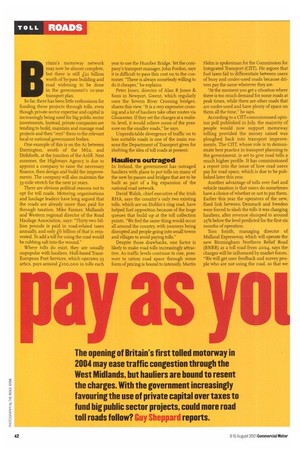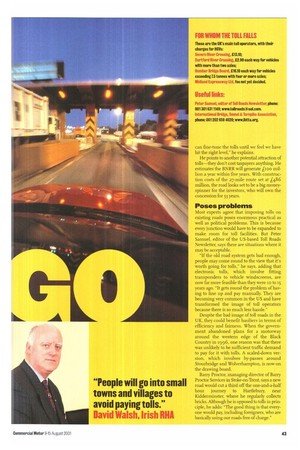ritain's motorway network may now be almost complete, but there
Page 42

Page 43

If you've noticed an error in this article please click here to report it so we can fix it.
is still 121 billion worth of by-pass building and road widening to be done in the government's ro-year transport plan.
So far, there has been little enthusiasm for funding these projects through tolls, even though private sector expertise and capital is increasingly being used for big public sector investments, Instead, private companies are tending to build, maintain and manage road projects and then 'rent" them to the relevant local or national government bodies, One example of this is on the Ai between Darrington, south of the M62, and Dishforth, at the junction of the Ara Next summer, the Highways Agency is due to appoint a company to raise the necessary finance, then design and build the improvements. The company will also maintain the 33-mile stretch for the next 30 years.
There are obvious political reasons not to opt for toll roads. Motoring organisations and haulage leaders have long argued that the roads are already more than paid for through taxation. Mike Farmer, Midlands and Western regional director of the Road Haulage Association, says: "Thirty-two billion pounds is paid in road-related taxes annually, and only i6 billion of that is reinvested. To add a toll for using the road would be rubbing salt into the wound."
Where tolls do exist, they are usually unpopular with hauliers. Hull-based TransEuropean Port Services, which operates 25 artics, pays around D00,000 in tolls each year to use the Humber Bridge. Yet the company's transport manager, John Fordon, says it is difficult to pass this cost on to the customer. "There is always somebody willing to do it cheaper," he explains.
Peter Jones, director of Alan R Jones Ez. Sons in Newport, Gwent, which regularly uses the Severn River Crossing bridges, shares this view It is a very expensive crossing and a lot of hauliers take other routes via Gloucester. If they set the charges at a realistic level, it would relieve some of the pressure on the smaller roads,' he says.
Unpredictable divergence of traffic on to less suitable roads is one of the main reasons the Department of Transport gives for shelving the idea of toll roads at present.
Hauliers outraged
In Ireland, the government has outraged hauliers with plans to put tolls on many of the new by-passes and bridges that are to be built as part of a big expansion of the national road network.
David Walsh, chief executive of the Irish RHA, says the country's only two existing tolls, which are on Dublin's ring road, have helped fuel opposition because of the huge queues that build up at the toll collection points. "We feel the same thing would occur all around the country, with journeys being disrupted and people going into small towns and villages to avoid paying tolls."
Despite those drawbacks, one factor is likely to make road tolls increasingly attractive. As traffic levels continue to rise, pressure to ration road space through some form of pricing is bound to intensify. Martin Helm is spokesman for the Commission for Integrated Transport (CfIT). He argues that fuel taxes fail to differentiate between users of busy and under-used roads because drivers pay the same wherever they are.
"At the moment you get a situation where there is too much demand for some roads at peak times, while there are other roads that are under-used and have plenty of space on them all the time," he says.
According to a CfIT-commissioned opinion poll published in July, the majority of people would now support motorway tolling provided the money raised was ploughed back into transport improvements. The CfIT, whose role is to demonstrate best practice in transport planning to the government, is set to give road tolls a much higher profile. It has commissioned a report into the issue of how road users pay for road space, which is due to be published later this year.
Another advantage of tolls over fuel and vehicle taxation is that users do sometimes have a choice of whether or not to pay them. Earlier this year the operators of the new, fixed link between Denmark and Sweden were forced to slash the tolls it was charging hauliers, after revenue slumped to around 25% below the level predicted for the first six months of operation.
Tom Smith, managing director of Midland Expressway, which will operate the new Birmingham Northern Relief Road (BNRR) as a toll road from 2004, says the charges will be influenced by market forces. "We will get user feedback and survey people who are not using the road, so that we
can fine-tune the tolls until we feel we have hit the right level," he explains.
He points to another potential attraction of
tolls they don't cost taxpayers anything. He estimates the BNRR will generate iI00 million a year within Eve years. With construction costs of the 27-mile route set at £486 million, the road looks set to be a big moneyspinner for the investors, who will own the concession for 53 years.
Poses problems
Most experts agree that imposing tolls on existing roads poses enormous practical as well as political problems. This is because every junction would have to be expanded to make room for toll facilities. But Peter Samuel, editor of the US-based Toll Roads Newsletter, says there are situations where it may be acceptable.
if the old road system gets bad enough, people may come round to the view that it's worth going for tolls," he says, adding that electronic tolls, which involve fitting transponders to vehicle windscreens, are now far more feasible than they were in to t5 years ago. 'It gets round the problem of having to line up and pay manually. They are becoming very common in the US and have transformed the image of toll operators because there is so much less hassle."
Despite the bad image of toll roads in the UK, they could benefit hauliers in terms of efficiency and fairness. When the government abandoned plans for a motorway around the western edge of the Black Country in 1996, one reason was that there was unlikely to be sufficient traffic demand to pay for it with tolls. A sealed-down version, which involves by-passes around Stourbridge and Wolverhampton, is now on the drawing board.
Barry Proctor, managing director of Barry Proctor Services in Stoke-on-Trent, says a new road would cut a third off the one-and-a-half hour journey to Hardebury, near Kidderminster, where he regularly collects bricks. Although he is opposed to tolls in principle, he adds: "The good thing is that everyone would pay, including foreigners, who are basically using our roads free of charge."




























































































































